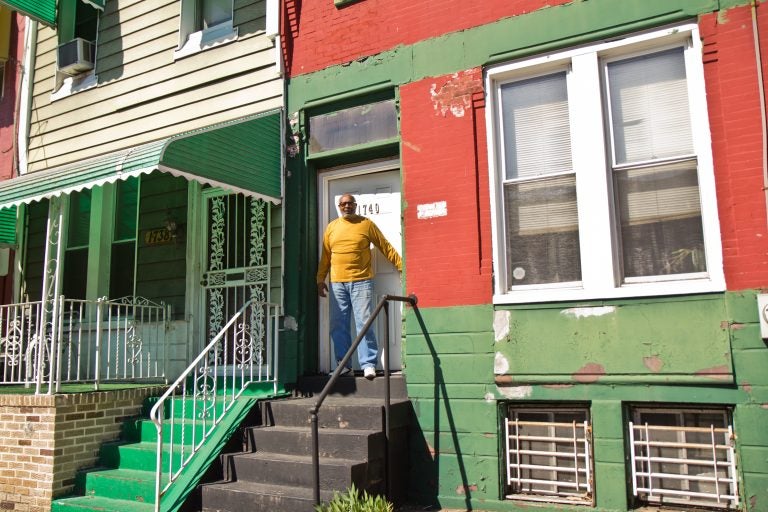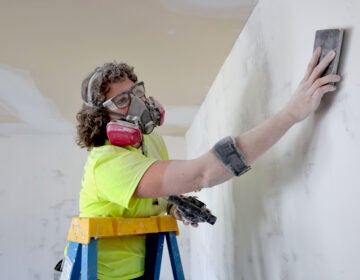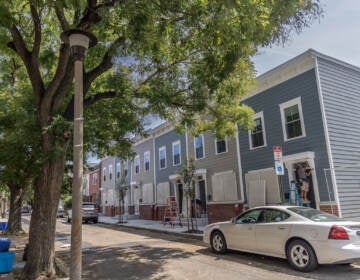New help is here for Philly seniors who want stay in their homes
A new program launched by Thomas Jefferson University, Drexel and Habitat for Humanity Philadelphia is helping seniors live independently in their homes.
Listen 2:57
Bobby McCurdy outside of his home in North Philadelphia. (Kimberly Paynter/WHYY)
This story originally appeared on PlanPhilly.
—
Bobby McCurdy, 76, lives on his own in the four-bedroom Sharswood home he inherited from his mother. Living alone at this stage in his life doesn’t bother him — he likes the freedom to do what he wants, when he wants, he said.
But what McCurdy does mind is the house itself. A crack trails across his plastered ceiling. The television sits against a wall painted Persian blue, but a leak from the upstairs bathroom has discolored the paint. Repairs like this were easy for him in the past; these days, he needs another option for maintaining his home.
“I couldn’t climb up that ladder anymore,” McCurdy said, who had always been his own handyman. “And I figure I like being in here by myself. If I get up on that ladder and fall off, that’s a problem.”
Recently, McCurdy found the solution he was looking for in the form of a new program launched by Thomas Jefferson University’s department of occupational therapy, Drexel University’s College of Nursing and Health Professions, and Habitat for Humanity Philadelphia. CAPABLE stands for Communities Aging in Place — Advancing Better Living for Elders.
CAPABLE offers coordinated multidisciplinary teams to help seniors manage low-cost house repairs, occupational therapy, and nursing needs so they can stay in their homes without risking health and safety.
“It could be something like, ‘I want to be able to do my laundry, and I can’t get into my basement to do my laundry anymore,’” said Emily Lucas, home repair director for Habitat for Humanity Philadelphia. “The nurse and the occupational therapist can help them around meeting their health goals. Then our housing folks can help around any modifications that need to happen to the house.”
The program is designed to benefit those 65 and older who are physically and financially unable to complete one or more daily domestic activity such as cooking, bathing or going in or out of the house. The program prioritizes owner-occupied senior households in the Mantua, Mill Creek, Brewerytown, Belmont and Sharswood neighborhoods, but low-income seniors who own homes or live with a homeowner anywhere in the city are eligible to apply.
“We don’t want to see people — long-term residents — get displaced,” Lucas said. “And one of the mechanisms to prevent displacement is to help folks get the resources they need to live for a long time deeply in their homes.”
Catherine Piersol, chair of Jefferson’s department of occupational therapy, said small home improvements can go a long way for seniors.
“There’s a whole lot of people living at home independently that have to stop doing things that they really value,” because of an issue that could be resolved with a minor repair or adaptation, said Piersol.
Annie Enlow, 77, moved into her Southwest Philly home in 1971. Arthritis recently started to cause weakness in her knees, making it hard for her to reach kitchen cabinets and accomplish other everyday tasks.
“Sometimes it just gives away,” Enlow said. “I was scared if I get up [on a stool], I might fall.”
She doesn’t want to move out of her house so, last month, her daughter insisted she attend a CAPABLE info session.
Lucas said it is easier for seniors to think of selling when they do not have resources to maintain their home.
“When a developer comes knocking on their door, offering them cash, they might not want to sell their house,” Lucas said. “But if they have a big repair need that they cannot afford, then, often times, they have to choose that option. Then that’s a loss of a longtime resident.”
The seven-month program is new to Philadelphia, but similar efforts have worked elsewhere. The inspiration comes from a study of home-based interventions for seniors done by Laura Gitlin, the dean of Drexel’s nursing and health professions school.
Gitlin’s study provided occupational therapy, physical therapy and home repair visits to 319 participants who were at least 70 for six months. The study found that participating in the program reduced mortality by 9% after 12 months. Seniors admitted to the hospital one year after their entry into the study also had a greater survivorship rate.
CAPABLE participants get six occupational therapy visits, four registered nurse visits and installation of accessibility equipment or home modifications provided by Habitat.
McCurdy said he was thinking about selling his home and moving to North Carolina before he found the program.
It was a combination of developers’ outreach and needed home repairs that prompted him to consider uprooting. He found CAPABLE at the right moment, he said. “I think if you believe enough then you can kinda come up with something — some kind of solution.”
WHYY is your source for fact-based, in-depth journalism and information. As a nonprofit organization, we rely on financial support from readers like you. Please give today.






